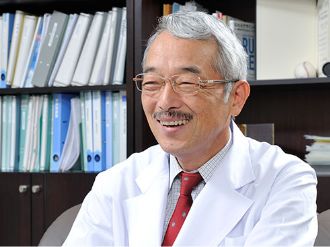Why we adopted coaching at our hospital(2)
Director's Leadership Redevelopment through Coaching
Yokosuka Kyosai Hospital
Dr. Kaoru Nagahori
Hospitals in Japan are currently undergoing a wave of upheaval: they are in a structural recession with 70% of them in red , and they are being forced to make decisions about how to position themselves under the regional healthcare plan.
In 2014, when I took over as director, the hospital (747 beds, 9.3-day length of stay, 7,000 surgeries, 10,000 ambulances) was in crisis. The pediatrics department was on the verge of disappearing, 20% of ambulances were being turned down, and the hospital was on the verge of going into the red. The hospital aimed to become a highly acute care hospital through a top-down approach, and we were able to achieve our goal by adding a comprehensive hospitalization system addition I, a specific ICU, and da Vinci to its two DPC groups, cancer center, and other facilities. Furthermore, as the next goal, I thought it was the right time to improve my own leadership. As a leader, there had been very few opportunities for me to analyze, visualize, and evolve myself and how my power the director, affects those around me.
Therefore, I adopted systemic coaching for as an approach to develop my own leadership. In the coaching, feedback from those around me revealed inconvenient truths. In the areas of "atmosphere in which it is easy to ask for advice" and "setting aside time to talk with subordinates," there was a discrepancy between my own high evaluation and the low evaluation of those around me. In addition, while "promoting strategies" for business achievement was rated highly, "building relationships with others" was given varying degrees of praise and criticism. My vague sense of unease now turned into tangible evidence.
In the coaching program, I coached five executives as a practical exercise while learning coaching theory for about six months, and was coached myself. In this process, I realized that I had been listening only to what I wanted to hear and not listening enough to what they wanted to talk about.
Six months later, the assessment items of "He takes the time to listen to me," and "I am gaining new insights ( in coaching)," turned out to be the top rated items. The executive also commented, "I never thought that having the director listen to me would enable me to achieve my goals.
It was a new discovery that taking time for the other person in coaching with genuine curiosity, listening to their motivations and background, and repeating the dialogue could produce results, and we could sense changes in our relationship with each other.
プロフィール
Dr. Kaoru Nagahori
Yokosuka Kyosai Hospital
Director of Yokosuka Kyosai Hospital

Brief History
- 1978
- Graduated from Yokohama City University School of Medicine
- 1980
- Research Assistant, First Department of Anatomy, Yokohama City University School of Medicine
- 1983
- Medical Assistant, Second Surgery, Yokohama City University School of Medicine
- 1984
- Research Assistant, First Department of Surgery, Yamanashi Medical University, Medical Director
- 1987
- Postdoctoral Fellow, Biochemical Genetics, City of Hope Research Institute, California, U.S.A.
- 1989
- Assistant Professor and Chief of Medicine, 1st Department of Surgery, Yamanashi Medical University
- 1995
- Lecturer, Department of Surgery 1, Yamanashi Medical University
- 1998
- Lecturer, Surgery Dept. 2, Yokohama City University Urafune Hospital
- 2001
- Chief of Surgery, Yokosuka Kyosai Hospital
- 2005
- Chief of Clinical Departments, Yokosuka Kyosai Hospital
- 2009
- Deputy Director and Branch Director, Yokosuka Kyosai Hospital
- 2012
- Chief of the Department of Surgery, Yamanashi Prefectural Hospital
- 2013
- Acting Director of Yokosuka Kyosai Hospital
- 2014
- Hospital Director of Yokosuka Kyosai Hospital
- 2017
- Clinical Professor, Yokohama City University School of Medicine
To present
Roles
- Board Certified Surgeon, Japan Surgical Society
- Medical Advisor and Board Certified Surgeon, Japanese Society of Gastroenterological Surgery
- Advising Doctor, Japanese Society of Gastroenterological Disorders, Councilor of Kanto Branch
- Medical Advisor and Board Certified Doctor, Japanese Society of Hepatology
- Councilor, Japan Society of Hepato-Biliary-Pancreatic Surgery, Highly Skilled Specialist
- Councilor, Japanese Society for Endoscopy, Certified Technologist
- Medical Advisor, Japan International Medical Cooperation Center
- Vice President, Kanagawa Hospital Association
- Member of Kanagawa Prefecture Council for Acceptance of Emergency Medical Transport
- Chairman, Miura Peninsula Hospital Association